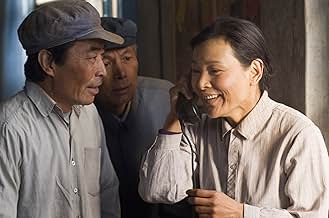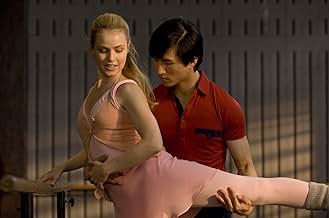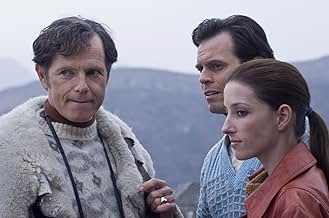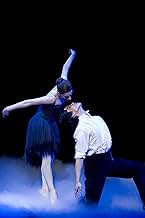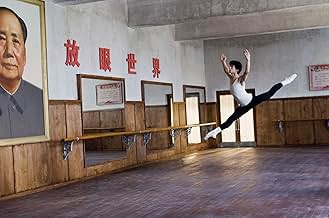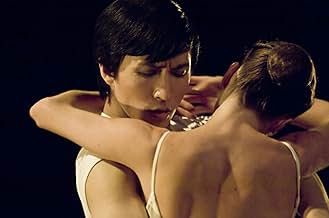IMDb RATING
7.3/10
8.5K
YOUR RATING
In Maoist China, a boy is taken from his family and trained to become a dancer, but everything he knows is challenged when he is chosen to attend a ballet summer school in Houston, Texas.In Maoist China, a boy is taken from his family and trained to become a dancer, but everything he knows is challenged when he is chosen to attend a ballet summer school in Houston, Texas.In Maoist China, a boy is taken from his family and trained to become a dancer, but everything he knows is challenged when he is chosen to attend a ballet summer school in Houston, Texas.
- Awards
- 7 wins & 20 nominations total
Christopher Kirby
- Mason
- (as Chris Kirby)
- Director
- Writers
- All cast & crew
- Production, box office & more at IMDbPro
Featured reviews
My husband and I went to see this movie yesterday and thought the acting was great from relatively unknown, at least to us, actors. I had some idea of what the movie was about prior to going to see it but it was even better than my expectations, and the lead actor was a truly magnificent dancer, as were the others.
The story was moving with a few humorous moments, and showed how disciplined a person must be in order to become a great dancer. I have to say it has been my experience that people generally leave before the credits but, like myself, they stayed, which says something for the acting and the movie itself.
I would recommend this movie to everyone, even those who are not fans of ballet.
The story was moving with a few humorous moments, and showed how disciplined a person must be in order to become a great dancer. I have to say it has been my experience that people generally leave before the credits but, like myself, they stayed, which says something for the acting and the movie itself.
I would recommend this movie to everyone, even those who are not fans of ballet.
One clever element of this film is the way in which various people who are significant in Li Cunxin's life, tell him stories with a message. The frog trapped at the bottom of a well is one. He hears from a toad at the top of the well that the big wide world is worth seeing.
The whole film is a story with a message - and the message is one that uplifts without in any sense being cloying. Beresford, the director, even manages at several stages to invoke the idiom of Chinese revolutionary film and theatre. The scenes actually shot in China are some of the most authentic in the film, which is not uniformly good in this regard. Somehow, the slightly stagy acting of some of the Huston Ballet Company characters, ceases to matter because the lead parts are well carried and the storyline is strong.
Li Cunxin defected to America partly for his art and partly for love. The wonders of the materiality of Huston are perhaps a poor substitute for losing your country; yet that country was deeply scarred by the Mao's cultural revolution. To watch the part early on where the benefits brought by Chairman Mao to the Chinese people, are laid out by Party Functionaries, has a dark poignancy, given that today we know he was directly responsible for the death of many, many millions.
The dance sequences are done very well and the film pleases at that level as well as a tale with more twists and turns than you might imagine.
A film of some subtlety and considerable beauty; recommended.
The whole film is a story with a message - and the message is one that uplifts without in any sense being cloying. Beresford, the director, even manages at several stages to invoke the idiom of Chinese revolutionary film and theatre. The scenes actually shot in China are some of the most authentic in the film, which is not uniformly good in this regard. Somehow, the slightly stagy acting of some of the Huston Ballet Company characters, ceases to matter because the lead parts are well carried and the storyline is strong.
Li Cunxin defected to America partly for his art and partly for love. The wonders of the materiality of Huston are perhaps a poor substitute for losing your country; yet that country was deeply scarred by the Mao's cultural revolution. To watch the part early on where the benefits brought by Chairman Mao to the Chinese people, are laid out by Party Functionaries, has a dark poignancy, given that today we know he was directly responsible for the death of many, many millions.
The dance sequences are done very well and the film pleases at that level as well as a tale with more twists and turns than you might imagine.
A film of some subtlety and considerable beauty; recommended.
In a village of China, the eleven year-old Li Cunxin is selected by the Comunist Party to study ballet at the Madame Mao's Dance Academy in Beijing. Years later, he travels to Houston in a cultural exchange program invited by the artistic director Ben Stevenson (Bruce Greenwood) and he is promoted to principal dancer of the Houston Ballet. Meanwhile he secretly dates and falls in love with the dancer Elizabeth Mackey (Amanda Schull).
When the China's government asks Li Cunxin (Chi Cao) to return to his country, he marries Liz and defects to USA. He is forbidden to return to China and has no news of his parents and family. Meanwhile, his marriage with Liz ends and he misses his parents. But five years later, he has a great surprise during a performance.
"Mao's Last Dancer" is a film about the true story of the Chinese ballet dancer Li Cunxin. The engaging biography of Li Cunxin is an example of discipline and strength associated with courage to make the right decisions, and it is amazing how a boy from a poor village in China could have become a great ballerino in the West.
Bruce Greenwood, Kyle MacLachlan and Joan Chen are well known actors and are fantastic, but Chi Cao, Chengwu Guo and the rest of the cast and dancers have also top-notch performances. Everything is perfect in this film, from the direction of Bruce Beresford to the cinematography and art direction. My vote is ten.
Title (Brazil): "O Último Bailarino de Mao" ("The Last Ballerino of Mao")
When the China's government asks Li Cunxin (Chi Cao) to return to his country, he marries Liz and defects to USA. He is forbidden to return to China and has no news of his parents and family. Meanwhile, his marriage with Liz ends and he misses his parents. But five years later, he has a great surprise during a performance.
"Mao's Last Dancer" is a film about the true story of the Chinese ballet dancer Li Cunxin. The engaging biography of Li Cunxin is an example of discipline and strength associated with courage to make the right decisions, and it is amazing how a boy from a poor village in China could have become a great ballerino in the West.
Bruce Greenwood, Kyle MacLachlan and Joan Chen are well known actors and are fantastic, but Chi Cao, Chengwu Guo and the rest of the cast and dancers have also top-notch performances. Everything is perfect in this film, from the direction of Bruce Beresford to the cinematography and art direction. My vote is ten.
Title (Brazil): "O Último Bailarino de Mao" ("The Last Ballerino of Mao")
To be honest, I've never actually finished Li's book. I had the vague idea its about a boy from my hometown that went on to become one of the best ballet dancers, but then, being a Chinese immigrant myself, I'm not particularly pleased with people 'cashing in' on their stories. After all, his story, in fact, was of particular interests to westerners because of the clashes of cultural identities between two worlds, which i and many thousands if not millions more overseas Chinese experience everyday. But after watching the movie, I have to say I loved it. The directing truly captured the struggle of a man torn apart between what 'ought to do' and what 'should do'.
I was born in Qingdao, China.So the connection between me and Li's story is very strong. Mr. Li is just about my parent's generation, so in a way, I can see his struggle in my own world, everyday. Qingdao is never short of artistic talent, to many, artistic talent is the only way out. 'There's no national boundaries in art', my parents used to tell me. When I was five my parents bought me my first piano, which cost them an entire year's savings, but it was seen as a valuable investment, 'art will pave the way to success', they used to say. Like my classmates in the piano class, I used to rise up 5 in the morning and practice until its time to go to school, only to come home then stay practicing until 10. Going to Beijing and to study in one of the national music academy would be many of my fellow classmate's dream. I can feel the pride Li's parents had when he went to America, I can also feel the pain he felt when he decided to stay in America. To Li and many others, to become what he was when he went to Beijing would be everything anyone could ever wanted. What more can he hope to achieve? He could've been the best ballet teacher in China, with fame and fortune to boot, but he threw all that away because of love and freedom. I don't believe it was because of money or fame, it was simply a choice made in a heartbeat by a young man who believes in himself.Was it selfish? I don't know. I'm confronted with this question everyday while I'm in Australia, to many Chinese and spectators, Li's action is selfish indeed, abandoning his duties, his parents and his place in the society pursuing freedom and love in a westerner's world. But the longer I stayed in western world, the harder I ponder that question, what is duty? and more importantly, what is a son's duty to his parents? to his nation? The value system is obviously very different back then, Li, who's seeking individual happiness didn't fit into a collective society like China. But, he also had the fortune to be plucked, trained and nurtured to become what he was. Should he repay his 'debt' by going back to China? or should he capitalise on what he has gained and achieve greater personal glory? It's easy to answer for anyone in a particular value group, but for Li and many Chinese overseas, it can be a life-long dilemma. After all, Li's fortunate enough to be sitting comfortably somewhere in Australia writing his book, many buried talents are somewhere in a dusted corner in China tutoring next generations of wannabe talents. But his fortune also comes from perseverance and handwork, from a heart to pursue what he truly believes in. To that end, the movie tells a brilliant story of a brave young man.
I was born in Qingdao, China.So the connection between me and Li's story is very strong. Mr. Li is just about my parent's generation, so in a way, I can see his struggle in my own world, everyday. Qingdao is never short of artistic talent, to many, artistic talent is the only way out. 'There's no national boundaries in art', my parents used to tell me. When I was five my parents bought me my first piano, which cost them an entire year's savings, but it was seen as a valuable investment, 'art will pave the way to success', they used to say. Like my classmates in the piano class, I used to rise up 5 in the morning and practice until its time to go to school, only to come home then stay practicing until 10. Going to Beijing and to study in one of the national music academy would be many of my fellow classmate's dream. I can feel the pride Li's parents had when he went to America, I can also feel the pain he felt when he decided to stay in America. To Li and many others, to become what he was when he went to Beijing would be everything anyone could ever wanted. What more can he hope to achieve? He could've been the best ballet teacher in China, with fame and fortune to boot, but he threw all that away because of love and freedom. I don't believe it was because of money or fame, it was simply a choice made in a heartbeat by a young man who believes in himself.Was it selfish? I don't know. I'm confronted with this question everyday while I'm in Australia, to many Chinese and spectators, Li's action is selfish indeed, abandoning his duties, his parents and his place in the society pursuing freedom and love in a westerner's world. But the longer I stayed in western world, the harder I ponder that question, what is duty? and more importantly, what is a son's duty to his parents? to his nation? The value system is obviously very different back then, Li, who's seeking individual happiness didn't fit into a collective society like China. But, he also had the fortune to be plucked, trained and nurtured to become what he was. Should he repay his 'debt' by going back to China? or should he capitalise on what he has gained and achieve greater personal glory? It's easy to answer for anyone in a particular value group, but for Li and many Chinese overseas, it can be a life-long dilemma. After all, Li's fortunate enough to be sitting comfortably somewhere in Australia writing his book, many buried talents are somewhere in a dusted corner in China tutoring next generations of wannabe talents. But his fortune also comes from perseverance and handwork, from a heart to pursue what he truly believes in. To that end, the movie tells a brilliant story of a brave young man.
A charming, stirring, visually and emotionally stirring film. The best I've thus far seen in '10. The story of a mainland Chinese 11 year old boy,supposedly forever indoctrinated by daily school- taught commie propaganda garbage,is chosen to attend a special school to be trained for ballet. He does well and in due time, is sent to the USA to the Houston Ballet Company. Then and there he awakens to not only his manhood but to the realization that all he's been taught about the "glory of Chairman Mao's communist revolution, was the furthest thing from the truth. Not only is the lead a wonderful danseur but his acting ability could win him a Best Actor nomination as well. A film NOT TO BE MISSED.
Did you know
- GoofsWhen Liz is leaving for San Francisco, She is driving out of the street. In the corner, it is obvious in the corner there is a street post saying "Darling St." in Sydney, with the City of Sydney logo on it. This scene is played in Houston.
- Quotes
Li - as an adult: Ben not understand. He's too much in love with China
- ConnectionsFeatured in Huckabee: Episode dated 25 September 2010 (2010)
- SoundtracksThe East Is Red
Written by Li You Yuan and Li Huna Zhi
Details
- Release date
- Country of origin
- Languages
- Also known as
- Le dernier danseur de Mao
- Filming locations
- Houston, Texas, USA(Downtown, and Galleria, opening scenes)
- Production company
- See more company credits at IMDbPro
Box office
- Gross US & Canada
- $4,817,770
- Opening weekend US & Canada
- $199,657
- Aug 22, 2010
- Gross worldwide
- $23,914,731
- Runtime
- 1h 57m(117 min)
- Color
- Sound mix
- Aspect ratio
- 1.85 : 1
Contribute to this page
Suggest an edit or add missing content







